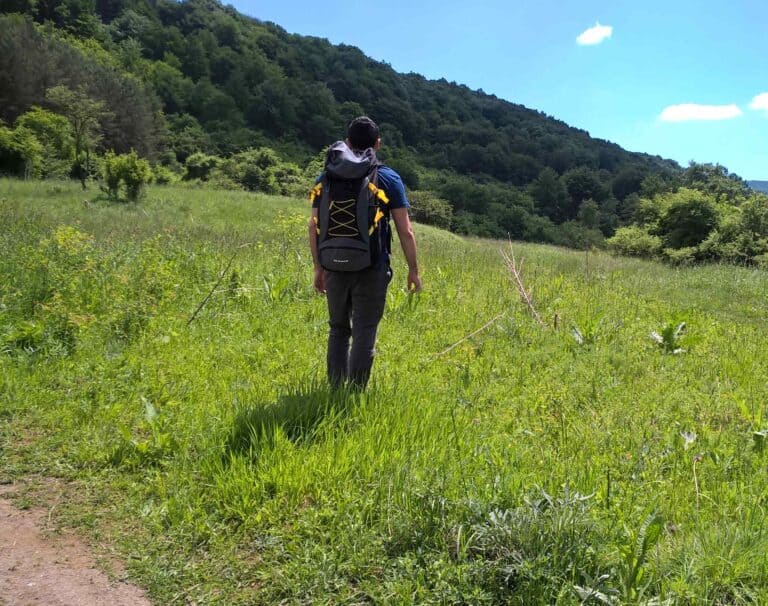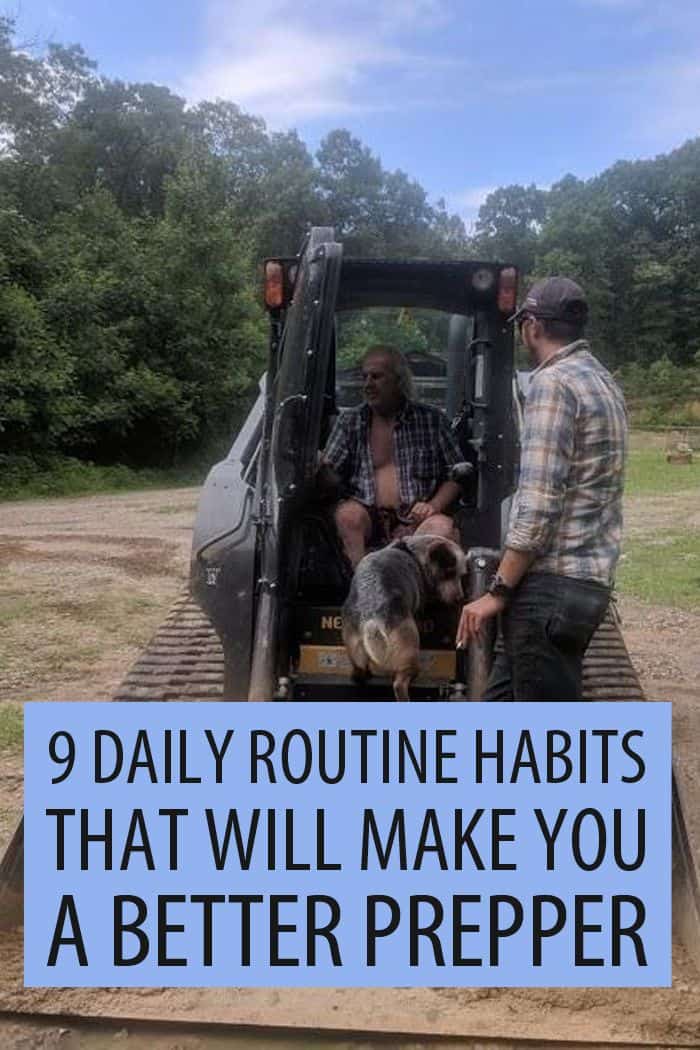Being a prepper is a lifestyle choice, and as such you will need to build up habits that will allow you to become a proper prepper rather than just somebody who happens to have food and supplies stocked up.
Some of the habits listed here might seem hard to manage and that is precisely why you must turn it into a habit. A habit is not something you do because you are required to, that is just how they start. A habit is something that you do naturally such as brushing your teeth or doing your bed in the morning.

If you train yourself to do all of these things soon enough you will have the skills and mental sharpness to survive when TSHTF. You should encourage your family members to take up these activities as well since it will increase the chances of your collective survival.
#1. Keep Fit
This is one of the most important aspects of the prepper’s lifestyle. Keeping fit will not only improve the quality of the life you are currently leading, but it will also greatly improve your chances of survival when TSHTF.
Granted, with all the things keeping you busy every day, it might seem impossible to spare time to get properly fit; however, that is exactly why you should make it a habit rather than a hobby. Remember, exercising is like eating: you need to do it every day.
You should also take into account the kind of fitness you will need to survive, for instance, even though yoga is a great way to keep fit, your ability to do the sleeping dog might not really come in handy so you should supplement it with some other form of exercise; the most advisable one is to get yourself into a martial arts class.
Learning martial arts will not only enable you to throw a punch if needed but it will also teach you discipline and awareness of your own body.
You might be tempted to get yourself into a gym and start lifting weights but even though it is a fantastic way to build muscle, you will need your muscles to be functional for other things than just lifting stuff.
Try boxing or crossfit. These sorts of activities will not only help you build muscle but it will also help you attain full control of your body as well as the kind of muscle flexibility that is essential to become a successful prepper.
Keeping fit is not only a bodily activity; you should also keep your mind sharp. Meditating is a good way of reducing stress and increasing mental acuity, playing logic and memory games will also help you keep your mind working to the highest level. Set apart a few minutes of every day to do this.
#2. Keep Informed
While it might seem like prepping is just a matter of stashing food and water, and keeping a BOB handy however, you will also need to know the kind of situation you might deal with in the future. It will be useless to be ready for a flood only to be hit by an EMP scenario.
Knowing what you might be facing is the best way of staying one step ahead of any situation. Read the news every day, it is not necessary to go in-depth, just get an idea of what the current situation is from different sources. It should take you around 10 daily minutes.
In order to be ready, you will need to keep informed. First, know where you live, and study the kind of natural phenomenon that might affect the area where you live. It’s of no use preparing for a tornado if your area is not going to be hit by one.
Of course, some instances cannot be predicted, for example, you might not be able to know when a devastating terrorist attack will happen, but you can learn to read the signs of an impending attack.
Scan the news every day; keep an eye out for both local and international threats. Planning for the worst-case scenario of each possible threat will allow you to deal with the aftermath comfortably.
#3. Always Carry Cash
This might be obvious to the most experienced preppers but it is easy to forget the importance of reminding people of this habit given how much we have come to rely on credit cards and ATMs.
You should always carry an appropriate amount of cash with you, adding some to your BOB is a fantastic idea but make a habit of keeping some on your person at all times. This way you will be able to move around more freely if you are not near your BO-V.
#4. Keep Your Skills Up to Date
Keeping your skills up to date is more than just making sure that you are able to survive, it is also about acquiring new skills that will help you improve your chances of survival.
The prepping community is very active and constantly devising new and more effective ways of surviving in different settings, reading about it and watching informative videos could be the difference between life and death in some cases.
Disclosure: This post has links to 3rd party websites, so I may get a commission if you buy through those links. Survival Sullivan is a participant in the Amazon Services LLC Associates Program. As an Amazon Associate, I earn from qualifying purchases. See my full disclosure for more.
With the demands the modern world has on all of us, it might seem hard to spare the time to read up on these things; however, it is easily managed if you set aside ten minutes of every day to read a prepper’s handbook, or a couple of articles. With just ten minutes daily you could be reading up to ten books a year, think about all the knowledge you will acquire!
#5. Pick Up a New Hobby and Practice
Picking up a new hobby will not only entertain you, it will also give you mastery over skills that might be marketable and help you survive TEOTWAWK.
Of course, you should not just pick any hobby; you should make sure that it would come in handy after TSHTF. This means anything from carpentry to soap making, even gardening is a good idea.
It is very likely that you already have certain skills that would be useful after TSHTF and have not even thought about them that way and it is only a matter of adjusting them to be useful. For instance, if you already know how to knit, then learn how to spin yarn and teach yourself how to make anything out of it.
It is important that you practice, otherwise, you will get rusty, and there’s no guarantee that you’ll be up for the job once the time comes to do it.
Setting time apart from your daily routine to practice this hobby will definitely help you; besides, it is an excellent relaxing technique after a long day. You should also encourage any able-bodied family member to do the same.
#6. Carry an Emergency Kit Everywhere
You should carry the basics of fire and water emergencies in your purse or bag without them taking up too much space. Even though it might seem like a burden at the beginning, carrying the most basic first aid implements (antiseptic wipes, one bandage, tweezers, and tape) can be the difference between living and dying.
Remember that a BOB is supposed to provide a way for a person to survive for 72 hours while a good emergency EDC kit has no time limit.
Depending on your area and the dangers you might be facing you can choose either of these two but if you keep it lightweight enough there is no such thing as being over-prepared.
#7. Keep Your Vehicle Emergency-Ready
This advice follows through perfectly from number six. Keeping your vehicle in tip-top shape means that you will be able to use it to get to where you need to go quickly and without having to stop.
Make sure that your tank is always almost full, this will allow you to get pretty much anywhere, and in certain situations such as an EMP scenario, it will be impossible for you to fill it.
While sports cars are pretty cool, you will definitely need more space than even a family sedan will allow so either get an SUV or make sure that your emergency stash is always accessible and close by.
You should always keep an extensive emergency kit in your vehicle. A great way of managing things is by using large plastic tubs to keep them inside your trunk. This is what you should consider keeping:
- A well-stocked first-aid kit
- Food (canned or with otherwise long shelf lives)
- Tools (fire starters, a good knife, flashlight, taser, etc.)
- Hygiene products (baby wipes, female hygiene products, toilet paper, etc.)
- A light-weight tent and/or a tarp
- Reusable plastic dishes
- Duct tape
- Rope
- Shoes
- Water bottles (invest in the kind that have long-lasting water filters)
Remember that your needs will vary from season to season so make sure that you keep only what is needed, this means adding items such as space blankets and extra fire starters during the winter. Make sure that you check your car kits weekly so that you are not caught out without useful equipment.
#8. Keep Your Cards Close to Your Chest
When you are excited about something it is very likely that you will want to tell people about it, especially when it is something close to your heart; however, talking to other people about prepping can be quite dangerous.
Remember that post-SHTF, it will be every man for himself, and letting your friends in on your plans will put you in danger if they are not preppers as well.
There is a wide prepper community online and many people are more than willing to give you advice on prepping but you may have noticed that very few people reveal their whole prepping scheme.
Post-collapse, people will be looking for a way to survive and you do not want to become a target of their interest so avoid spreading the word of what you are doing, and when you do share advice online, remember to remain anonymous.
Put your safety first, being labeled a prepper in today’s world is no walk in the park. You will face criticism, and it will only make things harder for yourself while you are prepping.
#9. Stay Alert and Aware 24/7
We covered the basis of this in the second entry; however, knowing your surroundings is more than just knowing your area.
You need to be on high alert every day, whenever you walk into an unknown place, make sure that you know where the emergency exits and the safe zones are, this way you will be able to get to them quickly if there is a problem.
Make it a habit to study where you are, what the people are like, and what you would do should disaster strike, at the beginning it will be hard to do, but with time plans will come easier and it will become second nature to scan your surroundings.
A big part of knowing your surroundings is knowing the people you are surrounded with. Indulge in some people watching and stay away from people who look like trouble. Remember the reading habit we mentioned in the fourth entry?
You can add to your reading list a few books on reading body language. This will be incredibly useful and will allow you to make a more educated guess on who means trouble. Watch people and act on your gut instinct, it is right most of the time.
Final Word
Building up good habits is far easier than breaking bad ones; it just takes discipline and willpower.
In the beginning, you might need something to remind you to get some of these done, setting up alarms or post-it notes around your house is a good idea at the very beginning so long as you remember to wean yourself off them so that it will become a habit rather than another chore. All that remains to say in closing is keep at it and good luck!


My name is Teresa Fikes. I am a Homesteader, survivalist, prepper, historian, and writer plus much more all in one package deal. I was raised on a small family farm were I was taught at an early age to survive off the land without the help of modern conveniences. I am a writer by profession and a Homesteader by Blood, Sweat, and Tears.

Amazing article
You should also use your new training in real world situation. Even if you bought a new hatchet. Try using it in other situations . If it has flat areas . Use it to drive tent pegs .
Your info contains symbolic letters that mean nothing to those who aren’t familiar with your sight; for example BOB. Is it too difficult to spell it out or give a footnote to interpret them?
BOB = bug out bag
TSHTF = when the shit hits the fan
TEOTWAWK = the end of the world as we know it
BO-V = bug out vehicle
EMP scenario = electromagnetic pulse scenario (EMPs can knock out internet, cell service and electricity so a lot of things we rely on daily won’t work, I think)
Thank you Teresa.
Good information and I agree on making these 9 habits a daily routine and not something to be despaired as a chore but rather valuable to be developed daily.